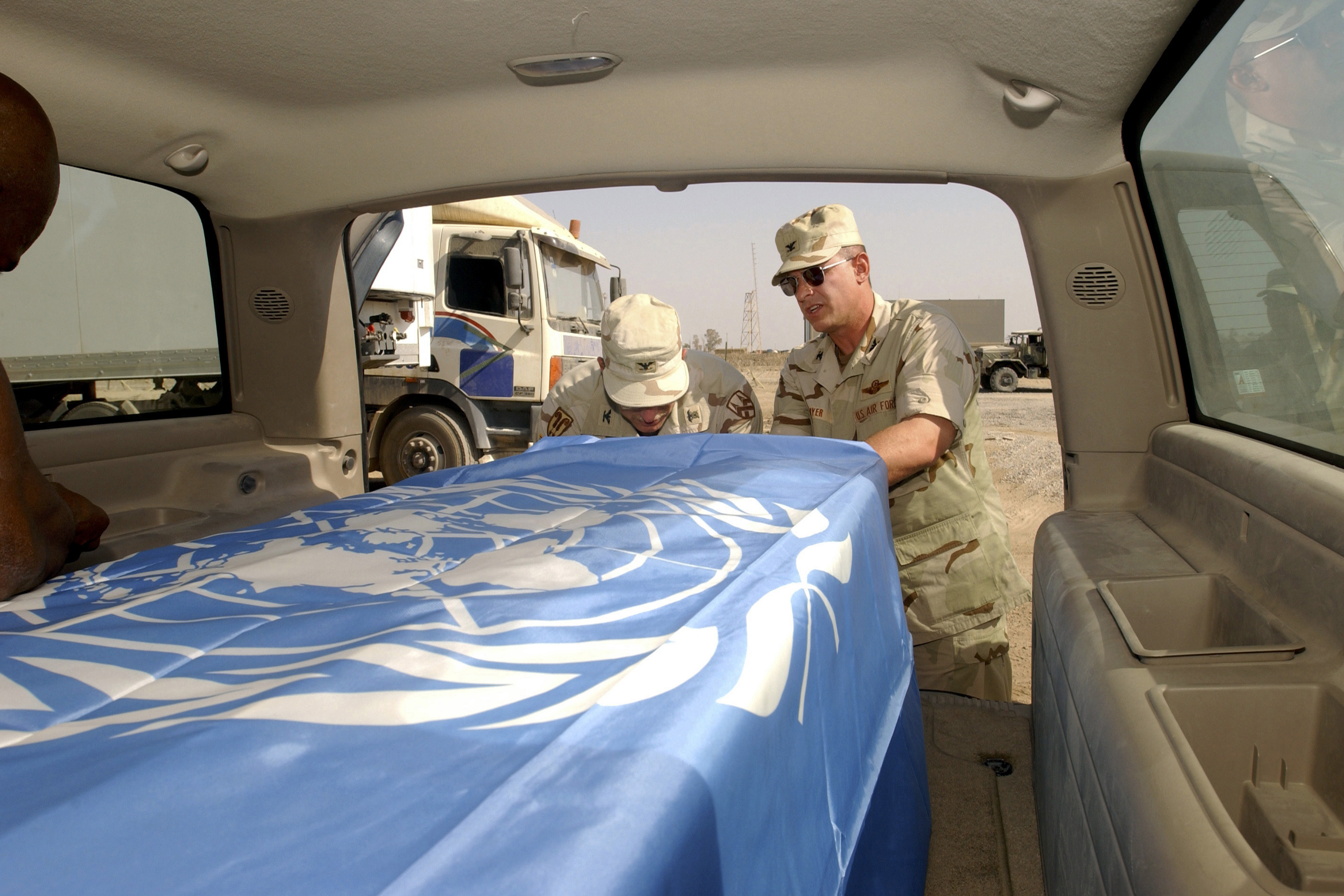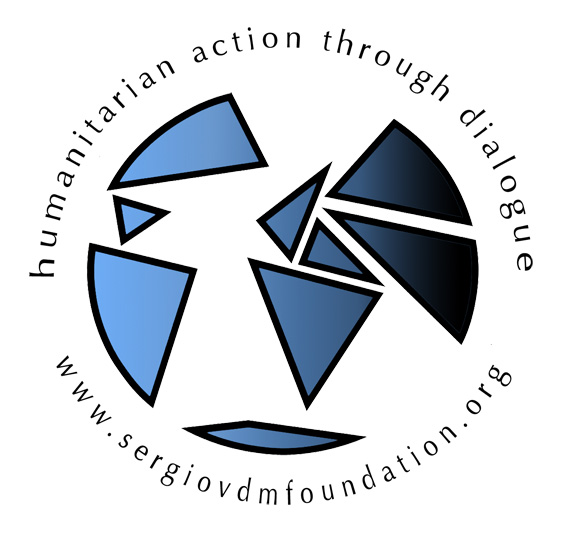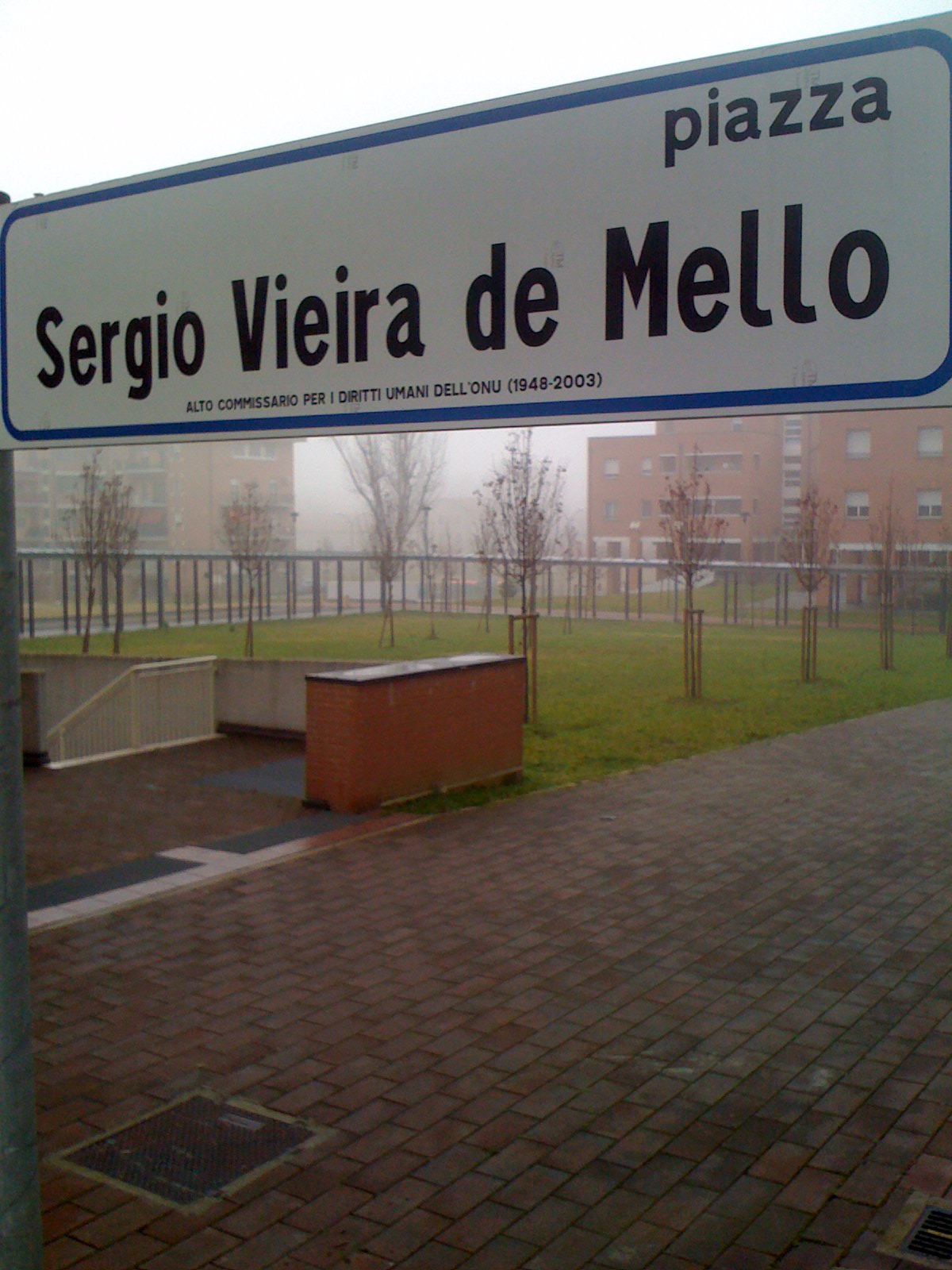1. Early Life and Background
Sérgio Vieira de Mello's early life was shaped by his family's diplomatic background and his experiences across various countries, which instilled in him a global perspective and a deep understanding of diverse cultures. His academic pursuits in philosophy further honed his critical thinking, laying the groundwork for his future humanitarian and diplomatic endeavors.
1.1. Early Life and Education
Vieira de Mello was born in Rio de Janeiro, Brazil, on 15 March 1948, to diplomat Arnaldo Vieira de Mello and Gilda dos Santos. He had an older sister, Sônia, who experienced schizophrenia throughout her adult life. Due to his father's diplomatic postings, Sérgio spent his formative years living in various cities around the world, including Buenos Aires, Genoa, Milan, Beirut, and Rome. In 1965, he began studying philosophy at the Federal University of Rio de Janeiro. However, frequent strikes disrupted classes, leading him to continue his education in Europe. He enrolled at the University of Paris (Sorbonne), where he studied philosophy under Vladimir Jankélévitch. During his time in Paris, he resided at an apartment in the Maison de l'Argentine, student housing at the Cité Internationale Universitaire de Paris designated for students with Latin American family ties.
Vieira de Mello participated in the 1968 student riots in Paris against the Charles de Gaulle government. During these protests, he was struck in the head by a police baton, resulting in a permanent disfigurement above his right eye. He also penned a letter supporting the riots, which was published in the French leftist journal Combat. This made his return to Brazil, then under a military dictatorship, potentially hazardous. After graduating from the Sorbonne in 1969, he moved to Geneva, Switzerland, to stay with a family friend. He further pursued his education, completing a Master of Arts in moral philosophy and a PhD by correspondence from the Sorbonne. His doctoral thesis, submitted in 1974, was titled The Role of Philosophy in Contemporary Society. In 1985, he earned a second "state" doctorate, the highest degree in the French education system, with a thesis titled Civitas Maxima: Origins, Foundations and Philosophical and Political Significance of the Supranationality Concept. In addition to his native Portuguese, Vieira de Mello was fluent in English, Spanish, Italian, and French, and also possessed some conversational ability in Arabic and Tetum.
1.2. Early Career Development
Vieira de Mello began his career with the United Nations in 1969, securing his first job as an editor at the United Nations High Commissioner for Refugees (UNHCR) in Geneva. This initial role marked the beginning of his extensive and impactful journey within the international humanitarian and diplomatic sphere.
2. United Nations Career
Sérgio Vieira de Mello's career within the United Nations was marked by a relentless dedication to humanitarian principles and an extraordinary capacity for diplomacy in some of the world's most challenging environments. He rose through the ranks, taking on increasingly complex and high-stakes roles that showcased his unique blend of operational expertise, political acumen, and unwavering commitment to human dignity.
2.1. Early UNHCR Field Assignments
Vieira de Mello's early career at the UNHCR saw him deployed to critical humanitarian crises around the world, where he gained invaluable hands-on experience in assisting refugees and displaced persons. His assignments were primarily operational, focusing on the direct provision of aid and support. He was sent to Bangladesh during its War of Independence in 1971, where he worked on the ground to provide assistance. In 1972, he was in Sudan following the Addis Ababa agreement, which ended the First Sudanese Civil War and facilitated the return of approximately 650,000 Sudanese refugees and displaced individuals. In 1974, he was deployed to Cyprus after the Turkish invasion.
He continued his field work with a posting in Mozambique, where he served as deputy head of the UNHCR office, effectively running the mission due to his boss's absence. In Mozambique, he assisted refugees fleeing white rule and civil war in Zimbabwe (then Rhodesia). He also spent three years in Peru, managing UNHCR operations. These early assignments involved organizing food aid, shelter, and other forms of assistance, laying the foundation for his reputation as a highly effective and compassionate field officer.
2.2. Diplomatic and Humanitarian Missions
Throughout his career, Vieira de Mello undertook numerous diplomatic and humanitarian missions in complex conflict zones, demonstrating his ability to engage with diverse actors, including armed groups, to achieve humanitarian objectives. He played a crucial role in addressing the plight of refugees and promoting peace in some of the most volatile regions.
He served as Special Envoy for the UNHCR for Cambodia, becoming the first and only UN Representative to hold talks with the Khmer Rouge. Between 1981 and 1983, he was a senior political adviser to the United Nations Interim Force in Lebanon (UNIFIL). In 1985, he returned to Latin America to head the UNHCR office in Buenos Aires, Argentina. The 1990s saw him heavily involved in the clearing of land mines in both Cambodia and then in Yugoslavia. After addressing the refugee problem in Central Africa, he was also instrumental in dealing with the issue of boat people in Hong Kong. In mid-2000, he visited Fiji alongside Don McKinnon, the Commonwealth of Nations' Secretary-General, in an attempt to help negotiate a settlement to a hostage situation where Fiji's Prime Minister and other members of Parliament were kidnapped during the 2000 Fijian coup d'état.
2.3. Senior Roles and Leadership
Vieira de Mello's exceptional leadership and deep understanding of humanitarian and political affairs led to his appointment to several high-ranking positions within the UN system. These roles allowed him to influence policy and coordinate large-scale international efforts. He was made Assistant High Commissioner for Refugees in 1996. Two years later, in 1998, he became Under-Secretary-General for Humanitarian Affairs and Emergency Relief Coordinator, a position he held until January 2001, sometimes simultaneously with other duties.
2.4. Peacekeeping and Transitional Administration
His expertise in post-conflict environments was particularly evident in his roles in peacekeeping and transitional administration, where he guided regions towards stability and self-governance. He served as a special UN envoy in Kosovo after the UN took control over the Serbian province in 1999, initially for a period of two months.
From December 1999 to May 2002, Vieira de Mello served as the UN Transitional Administrator in East Timor. In this pivotal role, he guided the former Portuguese colony, which had been Indonesia's 27th province, towards full independence. His leadership was critical in establishing the necessary administrative and governance structures for the nascent nation.
2.5. UN High Commissioner for Human Rights
In 2002, Sérgio Vieira de Mello was appointed UN High Commissioner for Human Rights, a testament to his unwavering commitment to human dignity and justice. In this capacity, he was responsible for leading the UN's efforts to promote and protect human rights globally. His work involved advocating for the rights of vulnerable populations, monitoring human rights situations in various countries, and working to strengthen international human rights mechanisms. This role placed him at the forefront of global human rights advocacy, allowing him to leverage his extensive diplomatic experience to address some of the most pressing human rights challenges of his time.
2.6. Iraq Assignment
In May 2003, Vieira de Mello was appointed as the Special Representative of the UN Secretary-General to Iraq. This assignment was initially intended to last for four months. According to journalist James Traub in his book The Best Intentions, Vieira de Mello initially declined the appointment three times before Kofi Annan was reportedly pressured by US President George W. Bush and Condoleezza Rice to secure his acceptance.
In March 2003, Vieira de Mello met with President Bush, during which they discussed the human rights situation at the Guantanamo Bay detention camp, a controversial issue for the United States. In June 2003, he was part of a team responsible for inspecting Abu Ghraib prison before its planned rebuilding. He was actively working in this capacity when he was killed.
3. Personal Life
Sérgio Vieira de Mello's personal life, though less public than his professional endeavors, was marked by significant relationships and the complexities that arose from his demanding career. In 1973, he married Annie Personnaz, a French staff member at UNHCR Headquarters in Geneva. Together, they had two sons, Laurent and Adrien. The family initially lived in the French town of Thonon-les-Bains before moving to a permanent home in the French village of Massongy, near the Geneva border.
Despite still being legally married, Sérgio and Annie were separated before his death, with a divorce lawsuit filed on 9 January 2003, which was never finalized. From 2001 onwards, he was in a relationship with Carolina Larriera, whom he had met in East Timor, where she worked as part of the General Service support staff for the UN mission. Sérgio and Carolina's union lasted until his death. After a legal process spanning more than ten years, Larriera won a lawsuit against his wife, heirs, and estate, resulting in the recognition of their civil union as valid in Brazil, despite bigamy being illegal in the country.
Following his death, the United Nations did not officially recognize Sérgio and Carolina's union. Carolina stated that she was excluded from the list of survivors of the Canal Hotel bombing, and her comments were not considered in the report regarding the attack. She was not invited to any of the UN celebrations honoring his life, while his estranged wife, Annie, was recognized by the UN as Sérgio's widow. Annie Personnaz continues to live in France and co-founded the Sérgio Vieira de Mello Foundation with their two sons and close friends and colleagues to honor his name and memory. Sérgio Vieira de Mello also had a daughter, Benedicta, who was born posthumously and later also worked for the UN.
4. Death

Sérgio Vieira de Mello was serving as the United Nations Special Representative for Iraq when he was killed on 19 August 2003, in the devastating Canal Hotel bombing in Baghdad. The attack resulted in the deaths of Vieira de Mello and 20 other members of his staff.
Abu Musab al-Zarqawi, a leader of the al-Qaeda terrorist organization, claimed responsibility for the powerful blast. A communiqué from al-Qaeda stated that Vieira de Mello was assassinated because he had assisted East Timor in becoming an independent state, which the group viewed as "stealing territory from the Islamic caliphate."
Vieira de Mello's death was widely mourned across the international community, largely due to his esteemed reputation for effectively working to promote peace and his dedication to humanitarian causes. Before his tragic passing, he had been mentioned in some circles as a potential candidate for UN Secretary-General. He had expressed a wish to be buried in his hometown of Rio de Janeiro, Brazil, where he had lived for 34 years. However, his body was transported from Brazil and he was ultimately buried at the Cimetière des Rois in Geneva, Switzerland. Despite this, a state funeral with full military honors was held in his hometown of Rio de Janeiro, attended by President Luiz Inácio Lula da Silva and other international dignitaries. He was survived by his two sons, Adrien and Laurent, and his posthumously born daughter, Benedicta.
5. Legacy and Commemoration
Sérgio Vieira de Mello's profound impact on international humanitarian efforts and diplomacy continues to be recognized and honored through various posthumous awards, commemorative initiatives, and cultural portrayals. His life and work serve as an enduring inspiration for those dedicated to peace, human rights, and the protection of vulnerable populations.
5.1. Posthumous Honors and Awards
Vieira de Mello received numerous posthumous honors and awards from governments and international organizations in recognition of his extraordinary contributions. Among the most prominent was the Legion d'honneur, France's highest honor, which was presented to his widow and two sons in Geneva. The Government of Brazil posthumously awarded him the Order of Rio Branco, the highest honor given to a Brazilian citizen, and the Pedro Ernesto Medal, the highest honor in his hometown of Rio de Janeiro, both in 2003. In April 2004, he was posthumously given the "Statesman of the Year Award" by the EastWest Institute. He was also a recipient of the United Nations Prize in the Field of Human Rights in 2003 and the Pax Christi International Peace Award in 2004. The Government of Brazil also established the Sergio Vieira de Mello Medal to honor his legacy in promoting sustainable peace, international security, and better living conditions for individuals in situations of armed conflict.
5.2. Commemorative Initiatives
Several foundations, centers, and initiatives have been established in Vieira de Mello's memory to continue his work and uphold his ideals.

The Sérgio Vieira de Mello Center was founded by his mother, Gilda Vieira de Mello, and his surviving partner, Carolina Larriera, who is also a former UN diplomat and Harvard-trained professional. The Center works to honor his legacy, operating with a network of supporters from Brazil, his country of nationality, and Timor-Leste, the country he helped establish, extending its reach globally. The Sérgio Vieira de Mello Center collaborates through a nationwide network of universities specializing in international relations, aiming to nurture the next generation of world ambassadors. Specifically, it focuses on leveraging technology, entrepreneurship, and networks to mobilize mentors and disciples, building a sustainable peace model that can be easily replicated. It engages engineers and education professionals from Harvard and MIT to empower local communities and schools, connecting academic experts with grassroots initiatives and disenfranchised youth to identify readily achievable opportunities. In collaboration with ANAPRI, the National Association of International Relations Professionals, the Center is advocating for increased resources in Congress to professionalize the sector. The Center actively supports a network of over one hundred schools and institutions bearing Sérgio's name in Brazil and abroad, providing teaching tools and in-kind materials. It also administers the Gilda Vieira de Mello Prize, dedicated to her son, which includes a monetary award of 5.00 K CHF and is presented annually in Geneva during the International Film Festival and Forum on Human Rights.

The Sergio Vieira de Mello Foundation was established in Geneva in 2007 at the initiative of his two sons and his estranged wife, along with friends and colleagues. Its mission is to honor his memory, pursue his ideals, and continue his unfinished work. Since 2008, the Foundation has hosted annual lectures at the Graduate Institute of International and Development Studies in Geneva, featuring prominent figures such as Kofi Annan (2008), Sadako Ogata (2009), Bernard Kouchner (2010), José Manuel Durão Barroso (2011), and Cornelio Sommaruga (2012).
On 11 December 2008, the United Nations General Assembly adopted Swedish-sponsored Resolution A/63/L.49 on the Strengthening of the Coordination of Emergency Assistance of the United Nations. This landmark resolution, among other important humanitarian decisions, officially designated 19 August as World Humanitarian Day (WHD). The date was chosen to commemorate the anniversary of the Canal Hotel bombing and to pay special recognition to all humanitarian and United Nations personnel who have worked to promote the humanitarian cause, particularly those who have died in the line of duty. The resolution urges all Member States, UN entities, and international and non-governmental organizations to observe it annually. The initiative to designate 19 August as World Humanitarian Day originated from Sérgio Vieira de Mello's family, who sought a fitting tribute to all humanitarian personnel. In early April 2008, the Board of the Sérgio Vieira de Mello Foundation prepared a draft resolution, which was subsequently co-sponsored by France, Switzerland, Japan, and Brazil.
Vieira de Mello also founded the United Nations Housing Rights Programme, which is now part of the United Nations Human Settlements Programme (UN-HABITAT). This program aims to assist states and other stakeholders in implementing their commitments outlined in the Habitat Agenda, promoting housing rights globally.

In January 2011, the Italian city of Bologna dedicated a square, Piazza Sérgio Vieira de Mello, in a modern part of its central Navile district, further cementing his place in international memory.
5.3. Cultural Impact
Sérgio Vieira de Mello's life and work have also been portrayed in cultural mediums, bringing his story to a wider audience. His life was the subject of the 2020 biopic Sergio, starring Wagner Moura in the title role. The film premiered at the Sundance Film Festival on 28 January 2020 and was released in the US on 17 April 2020. Additionally, a documentary film titled En Route to Baghdad (2009), directed by Brazilian journalist Simone Duarte, also explores his life and mission.
6. Career Chronology
- 1969-1971: French Editor, UNHCR, Geneva, Switzerland
- 1971-1972: Project Officer, UNHCR, Dhaka, East Pakistan
- 1972-1973: Programme Officer, UNHCR, Juba, Sudan
- 1974-1975: Programme Officer, UNHCR, Nicosia, Cyprus
- 1975-1977: Deputy Representative and Representative, UNHCR, Maputo, Mozambique
- 1978-1980: Representative, UNHCR, Lima, Peru
- 1980-1981: Head of Career Development and Training Unit of Personnel Section, UNHCR, Geneva, Switzerland
- 1981-1983: Senior Political Officer, UNIFIL, DPKO, Lebanon
- 1983-1985: Deputy Head of Personnel, UNHCR, Geneva, Switzerland
- 1986-1988: Chef de Cabinet and Secretary to the executive committee, UNHCR, Geneva, Switzerland
- 1988-1990: Director of Asia Bureau, UNHCR, Geneva, Switzerland
- 1990-1991: Director of External Affairs, UNHCR, Geneva, Switzerland
- 1991-1993: Director for Repatriation and Resettlement Operations, UNTAC, DPKO, and Special Envoy of High Commissioner Sadako Ogata, UNHCR, Phnom Penh, Cambodia
- 1993-1994: Director of Political Affairs, UNPROFOR, DPKO, Sarajevo, Bosnia-Herzegovina
- 1994-1996: Director of Operations and Planning, UNHCR, Geneva, Switzerland
- October-December 1996: Special Envoy of Secretary-General to the Great Lakes Region
- 1996-1998: Assistant High Commissioner for Refugees, UNHCR, Geneva, Switzerland
- 1998-2002: Under-Secretary-General for Humanitarian Affairs, UN, New York, US
- June-July 1999: Special Representative of the Secretary-General to Kosovo
- 1999-2002: Transitional Administrator, UNTAET, DPKO, and Special Representative of the Secretary-General of the United Nations, Dili, East Timor
- 2002-2003: High Commissioner for Human Rights, Geneva, Switzerland
- May-August 2003: Special Representative of the UN Secretary-General to Iraq